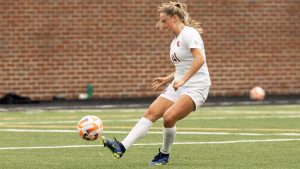It's NCAA Tournament time and with it comes the excitement and intensity of a survive and advance environment during which lapses in play can prove fatal to dreams of advancing to the College Cup. The level of competition, the unique matchups that exist, and the opportunity the tournament affords to play on the biggest stage in college soccer, all combine to make the NCAA Tournament a special and unique event. The NCAA Tourney is where the greatest challenges of the season occur. The schools in the forty-eight team tournament field from throughout the country that survive and advance are the ones with the heart of a champion who are able to dig deep and elevate their level of play in order to prevail and experience the joy of playing yet another day.
The teams that are able to make a sustained run in the tourney are the ones that avoid the following twelve pitfalls that can derail a team.
1. Playing not to lose instead of playing to win. Knowing that a loss will conclude the season can cause a team to fall into the trap of playing too conservatively and to stop doing the things they would normally do to create scoring opportunities. Defense wins championships but you still have to put the ball in the back of the net to win. Sometimes the old adage the best defense is a good offense is true.
2. It's great to enjoy being in the NCAA Tournament but getting caught up in the event instead of being focused on the task at hand is a mistake. This is more likely to happen to a team that has been absent from the tournament for an extended period of time but can negatively impact the play of even veteran teams.
3. Not sticking with what has worked for you all season. Successful teams continue to play their game and play to their own strengths regardless of who their opponent is.
4. Assuming that the result of a prior regular season contest whether a win or a loss will impact the outcome of an NCAA Tournament match. Many teams will square off with an opponent that they faced in regular season play. There are plenty of examples every year in which the outcome of a regular season contest and the outcome of an NCAA Tournament match are totally different.
5. Tired legs. Lack of depth can be hazardous to a team that has to play games in a short span of time particularly if long distance travel is involved. Injuries to key players this time of year can be devastating.
6. There is a reason that coaches dedicate time to practicing penalty kicks throughout the season. Whether or not a team survives and advances in the NCAA Tournament is highly likely to be determined at some point by a penalty kick shootout that may require the participation of five or more players.
7. Not traveling well. Unless a team is one of the top four seeds there is a pretty good chance that you will have to win on the road at some point to advance. The teams that play and win on Thursday and then must travel cross country to play on Sunday face a tough but not insurmountable challenge.
8. Looking past an opponent. Many a team has had an unexpected early exit because they were looking ahead to an opponent in the next round instead of first taking care of the opponent in front of them. Those who survive take it one contest at a time.
9. Lapses in play and organization particularly on the defensive side of the ball. The competition is fierce so even temporary lapses in play can be fatal. Teams that have difficulty staying focused for a full ninety minutes and overtime if required are unlikely to make a sustained run in NCAA Tournament play.
10. Poor play between the pipes. Missed opportunities in the run of play are unfortunate and harmful but errors in goal are deadly. No team is likely to advance far in NCAA Tournament play without a solid and consistent presence in goal.
11. Letting the pressure get the best of you. A sense of urgency must exist for any team to be successful so a little pressure is a good thing but if the pressure reduces creativity or causes a team to be tentative the result can be hazardous to their chances of leaving the pitch with a win.
12. Not staying hungry. Around this time of the year there is an "itch" on college campuses to be on Christmas break. Athletes are not immune to this and can find themselves dreaming of when the season is over. The best teams remind themselves of all their hard work and stay mentally engaged on the task at hand.




